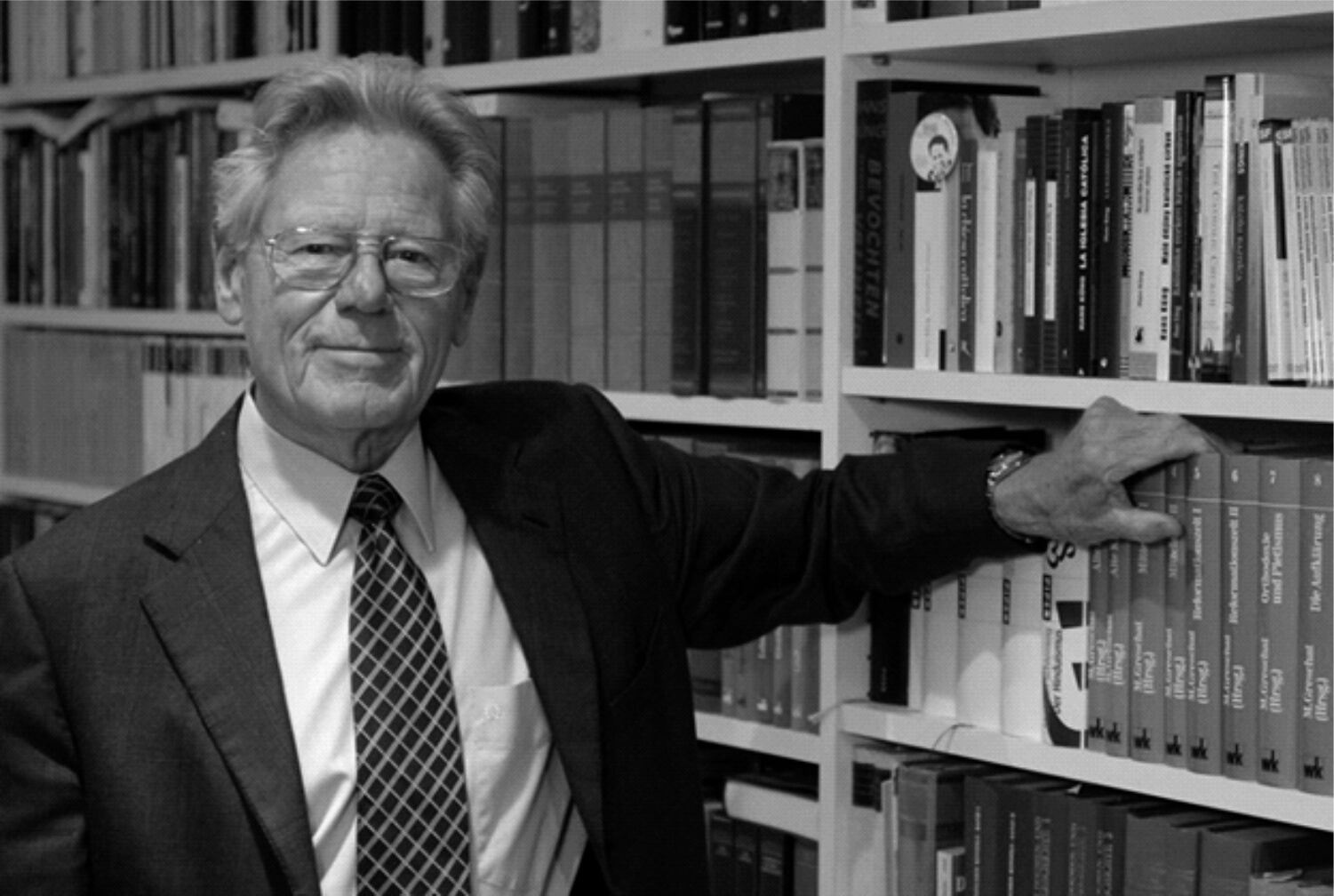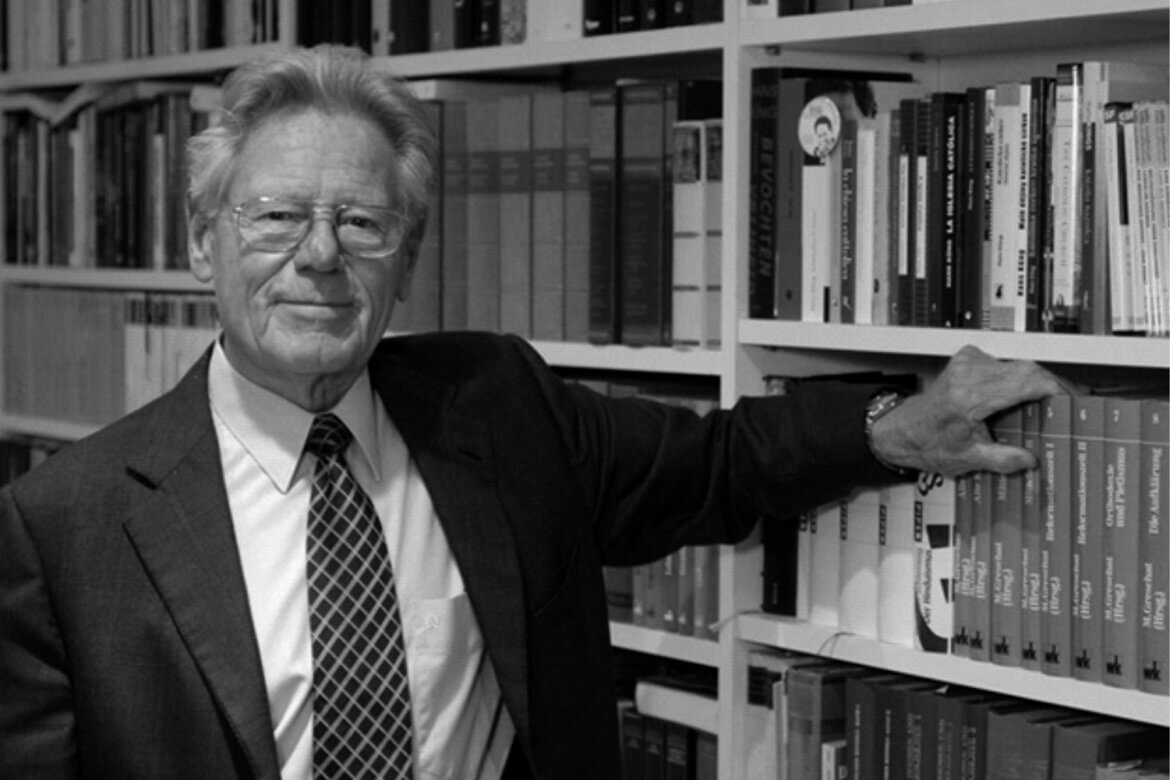Hans Küng, Celebrated Swiss Theologian, Established Global Ethic
Patricia Lefevere
Volume 35 Issue 4, 5 & 6 | Posted: July 8, 2021

Catholic priest and theologian Hans Küng, the renowned scholar and prolific writer who had lived with Parkinson’s disease, macular degeneration and arthritis since 2013, died April 6 at his home in Tubingen, Germany. He was 93.
Few men throughout Christendom have had as much to say or had their work seen by as many Christians — and others — as Küng, the celebrated and controversial Swiss theologian and Catholic priest.
Open a magazine or turn on the television in Europe and it’s likely the viewer caught the face and heard the Germanic-toned voice of the famous Swiss professor who lived, taught and lectured more than 40 years in Germany. Often, he was photographed in the company of heads of state — Britain’s Tony Blair, the Soviet Union’s Mikhail Gorbachev, Germany’s Helmut Schmidt, as well as world religious leaders.
He frequently carried on public dialogues with scholarly representatives of Buddhism, Chinese religions, Hinduism, Islam and Judaism. He also met with U.N. Secretary General Kofi Annan as he pursued his quest for a global ethic as a pathway toward international peace in the 21st century.
Tens of thousands of his readers living beyond Europe’s borders in America, Australia, Asia and Africa had heard him too, or at least read one or more of his tomes. He was the premier Catholic theologian to speak in China on religion and science, the first theologian to address a group of astrophysicists, and later the European Congress of Radiology on the subject of a more humane medicine.
Reasons for his popularity were ubiquitous: readability, clarity, erudition, honesty, fearlessness. He was smart, occasionally profound. Someone less intellectually gifted could understand his arguments and be drawn to his texts and his talks for just that reason. He said and wrote what he thought needed to be aired in what he deemed his relentless struggle for intellectual freedom and his passionate search for truth.
In his most popular book — Christ sein (On Being a Christian) — which quickly sold more than 200,000 hard covers in German alone when it was released in 1974, Küng said he probed theological issues that are of concern to any educated person. He wrote for those “who believe, but feel insecure,” those who used to believe “but are not satisfied with their unbelief” and those outside the church who are unwilling to approach “the fundamental questions of human existence with mere feelings, personal prejudices and apparently plausible explanations.”
For such a wide audience, Küng kept the Scriptures and the daily paper close at hand. From age 10 when the Nazis invaded Switzerland’s neighbor Austria, thus initiating World War II, the lad Hans — eldest of seven Küng children — began reading the daily paper. It was a discipline he maintained to his death despite declining vision. Keeping up on world and religious affairs rendered him “a realist, not a romanticist,” he told this reporter at a number of our meetings.
Often controversial, the name “Küng” came with its own brand of adjectives in conservative church and political publications: He was Küng the dissident, the bête noire, the disobedient, the heretic, the apostate, the errant, the Protestant. In short, ‘l’enfant terrible of the Catholic Church,’ yelled many a headline.
His 1971 book, Infallible?: An Inquiry, caused an uproar across the Catholic world, challenging the papal infallibility declaration promulgated in 1870 at the First Vatican Council. Küng probed its theological basis and found the claim of supreme papal authority to be an impasse to reunion with other Christian churches.
The book appeared only three years after the Vatican had asked Küng to answer charges brought against his earlier volume, The Church. Catholic officials disputed the theologian’s understanding of papal authority and requested he appear in Rome to answer charges.
Küng stood his ground. He would not recant. He wanted to see the file the Vatican had amassed on him. He demanded a written list of the questions regarding his book as well as the names of those vetting the work. He asked to speak in German during any meetings with Vatican officials and further requested that the Vatican pay his travel expenses to Rome or else hold the hearings at Küng’s house in Tübingen.
Besides taking on infallibility, Küng also criticized the law of celibacy, favoring instead a married clergy and a diaconate, with both open to women as well as men. He argued compulsory celibacy was the chief reason for the shortage of priests, and he accused the hierarchy of preferring to deny the faithful a close-to-home celebration of the Eucharist for the sake of maintaining mandatory celibacy. The law contradicted the Gospel and ancient Catholic tradition and ought to be abolished, he wrote.
He found fault with the ban on dispensations for priests who wanted to leave the priesthood — introduced by Pope John Paul II after his election as pontiff in 1978 — calling it a violation of human rights.
His historical critical approach to research led him to conclude that the early Christian communities in Corinth and elsewhere had had lay members preside over eucharistic services in the absence of a priest.
He took issue with the church’s ban on artificial contraception and its inhibitions in matters of human sexuality. He even had the chutzpah to critique the first year of the pontificate of John Paul II. In an essay appearing in eight papers across Europe, the Americas and Australia, Küng questioned whether the new pope was open to the world, was a spiritual leader, a true pastor, a collegial fellow bishop, an ecumenical mediator or even a real Christian.
Küng acknowledged that traditional Catholics would find the putting of such questions to the popular pope “more unforgivable than blasphemy.” But he said his criticism arose from “loyal commitment” to the church and he felt “the pope has a right to a response from his own church in critical solidarity.”
License to teach revoked
Headline writers and broadcasters had their day Dec. 18, 1979, when the Vatican pulled the rug out from under Küng’s teaching career, revoking his missio canonica, or license to teach as a Catholic theologian at the University of Tübingen, where he had been since 1960. Such a license is required to teach as a Catholic theologian at a pontifically recognized institution, like Tübingen’s Catholic theology school.
The German secular university has long had separate schools of Catholic and Protestant theology. Its Catholic school, at which Küng served as professor of dogmatic theology from 1963 to 1979, is renowned for its modern interpretation of the New Testament.
In Disputed Truth, Book 2 of his three volumes of memoirs, Küng spent 80 pages reviewing charges against him — secret meetings by German bishops and Vatican officials outside of Germany, betrayal by seven of his 11 Tübingen colleagues and a near physical and emotional breakdown caused by exhaustion from his efforts to answer Vatican accusations while preserving his place in a state university.
In the end, Küng retained his professorship, not in the Catholic faculty, but in the university’s secular Institute for Ecumenical Research, which he had founded and directed since the early 1960s. He also remained “a priest in good standing,” which upset those who sought his excommunication. Despite his outspokenness, Rome recognized his lifelong devotion to the church and allowed Küng to preach and to publish until illness and disability slowed him in 2013.
Küng indicated a certain dismay in 1979 when he learned of the involvement of Cardinal Joseph Ratzinger in the removal of his teaching license. As dean of theology at Tübingen in the early 1960s, Küng had offered — and Ratzinger accepted — a professorship at Tübingen. But following student revolts in Germany in 1968, Ratzinger left academia, returning to his native Munich where he became archbishop, then cardinal. He later headed the Congregation for the Doctrine of the Faith for 25 years under John Paul.
To the surprise of many, Küng requested a meeting with Ratzinger shortly after Ratzinger was elected pope in April 2005. The two priests had retained their respect for one another and a limited correspondence over 45 years. Ratzinger, now Pope Benedict XVI, quickly agreed to meet Küng. The pair talked for four hours and dined at Benedict’s summer residence at Castel Gandolfo.
A communiqué issued by the Vatican two days after the Sept. 24, 2005, reunion indicated the meeting was friendly and that Benedict praised Küng for his efforts to build a global code of ethics that enshrined the values that were held in common among religions and recognized by secular leaders, too.
The two did not take up any doctrinal questions. Nor did Küng ask that his teaching license be restored. Instead, they found accord on matters relating to science and religion, faith and reason, and social issues concerned with ethics and peace-building.
Although their shared evening was but a scintilla of time compared to the quarter-century that Küng had been in a state of strained relations with the Vatican, the theologian saw it as a sign of openness and even a harbinger of hope for those who share his critical vision of the church and what he had oft termed its “inquisitional proceedings” against him and against other dissidents.
For years, Küng had asked priests and bishops to show some courage against what he called a repressive Roman system that demanded obedience over reason and conformity over freedom of conscience. What was it in fact that gave this renegade thinker such abiding confidence in the midst of decades of struggle?
A hint is provided in On Being a Christian, which has seen many editions and been translated into dozens of languages. Küng called it “a small Summa” on which he worked for seven years. Its 720 pages probe whether Christian faith could continue to meet the challenges of the modern world and whether the Christian message was an adequate one for today’s men and women. Küng said he wrote it because he did not know what was specifically Christian, and he needed to find out.
Early in the work, Küng quoted German physicist and philosopher Carl Friedrich von Weizsäcker, who said: “There is one thing I would like to tell the theologians: something which they know and others should know. They hold the sole truth which goes deeper than the truth of science, on which the atomic age rests. They hold a knowledge of the nature of man that is more deeply rooted than the rationality of modern times. The moment always comes inevitably when our planning breaks down and we ask and will ask about the truth.”
Truth-seeking was the chosen task to which Küng brought his insatiable probing and unquenchable intellect.
“I have an infinite intellectual curiosity,” he told this reporter during the first of many meetings over nearly 40 years. “I am never satisfied. I must always know more about everything so I can detect just what are the problems. I do not have many prejudices before starting, as I do not fear the outcome.
“Christology presents so many problems and so people say: ‘It’s dangerous to touch the virgin birth, the pre-existence of Christ, the Trinity.’ But I think the truth cannot do harm — not to me personally and not to the church,” he told NCR.
The chance to reflect on God gave Küng enormous pleasure and satisfaction, he related in My Struggle for Freedom, the first volume of his memoirs.
Patricia Lefevere

